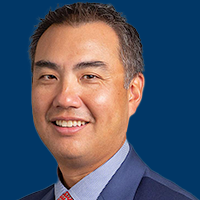Dr. Kauff on Challenges in Treating Uterine Cancer
Noah D. Kauff, MD, FACOG, gynecologist and geneticist, director, Ovarian Cancer Screening and Prevention, Gynecology Service, Department of Surgery, Memorial Sloan Kettering Cancer Center, discusses the main challenges in treating uterine cancer.
Noah D. Kauff, MD, FACOG, gynecologist and geneticist, director, Ovarian Cancer Screening and Prevention, Gynecology Service, Department of Surgery, Memorial Sloan Kettering Cancer Center, discusses the main challenges in treating uterine cancer.
Serous uterine cancer, described by Kauff as the one of the most aggressive of the uterine carcinomas, behaves more similarly to ovarian and fallopian tube cancer than low-grade endometrial cancer. This is because uterine cancer often presents at an advanced stage, frequently with disseminated disease in the abdomen. Early-stage disease, Kauff adds, has a recurrence rate of 40%-50%.
Additionally, patients with serous uterine cancer often have a worse prognosis than patients with similarly staged ovarian and fallopian tube cancer. Oncologists are unsure why this is, but Kauff adds there needs to be better treatment options for all pelvic serous cancers.



